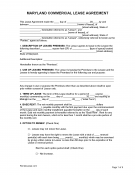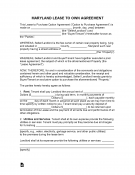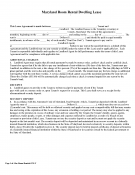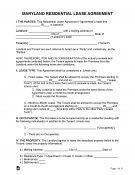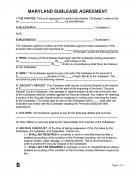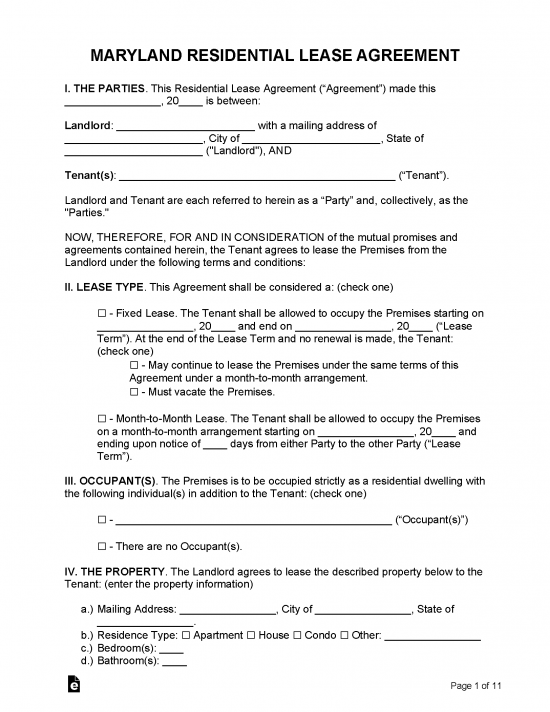Maryland lease agreements are documents that contain the binding terms for a residential tenancy. Lease agreements are written and agreed to by both the landlord and the tenant. They will set out the rent, identify responsibility for utilities, and explain the obligations of both parties. As a result lease agreements can be useful for avoiding a dispute because they make expectations clearer for both parties.
Contents
- Maryland Lease Agreements: By Type (6)
- Landlord-Tenant Laws
- Handbooks and Guides
By Type (6)
- Commercial Lease Agreement
- Month-to-Month Lease Agreement
- Rent-to-Own Lease Agreement
- Roommate Lease Agreement
- Standard Lease Agreement
- Sublease Agreement
Download: Adobe PDF, MS Word, Rich Text Format
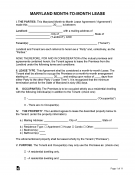 Month-to-Month Lease Agreement
Month-to-Month Lease Agreement
Download: Adobe PDF, MS Word, Rich Text Format
Download: Adobe PDF, MS Word, Rich Text Format
Download: Adobe PDF, MS Word, Rich Text Format
Download: Adobe PDF, MS Word, Rich Text Format
Download: Adobe PDF, MS Word, Rich Text Format
Landlord-Tenant Laws
Statutes – Real Property, Title 8 (Landlord and Tenant)
Required Disclosures (5)
Agent/Landlord Identification – A landlord must disclose the names and means of contact for anyone who will be allowed to enter the property (§ 8-210).
Lead-Based Paint Disclosure – For dwelling units built prior to 1978, federal law requires that landlords inform tenants of the hazards of lead-based paints.
Move-in/Move-out Checklist – Tenants have a right to request an inspection at the beginning of a tenancy, in order to make a record of the conditions of a dwelling unit, and may request an additional inspection upon moving out to compare for purposes of security deposit retention. This form may be used for both inspections (§ 8-203.1(a)).
Habitability – Lease agreements must guarantee that the property will be habitable when the tenant takes positions, and delineate responsibility for heat, electricity, gas, water, as well as the obligation to make necessary repairs (§ 8–208).
Security Deposit Receipt – If a landlord requires a security deposit from a tenant, the landlord must give the tenant a receipt. The receipt must also list the tenant’s rights as to return of the security deposit (§ 8–203).
Security Deposit Laws
Maximum Amount ($)
A landlord may charge no more than two (2) month’s rent as a security deposit (§ 8–203).
Returning to Tenant
A landlord must return a security deposit, with interest, to a tenant within forty-five (45) days of the termination of the tenancy. The landlord may retain a portion of the security deposit to account for unpaid rent, or damage beyond normal wear and tear. The tenant is allowed to be present for the inspection that produces the accounting of any amount owed, but to do so the tenant must notify the landlord at least fifteen (15) days before moving, and must do so in a written statement that also includes the tenant’s new address. Regardless of whether the tenant requests to be present for the inspection, the landlord must notify the tenant of any withholding, and mail all money owed, to the tenant’s last known address within forty-five (45) days of the end of the tenancy (§ 8–203)
When is Rent Due? (grace period)
There is no statutory rent due date; rather landlords and tenants may determine a date in the rental agreement. There is no statutory grace period.
Eviction Notice (non-payment)
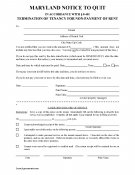 Notice to Pay or Quit – If a tenant does not provide rent on the day it is due, the landlord has the right to post this notice on the dwelling unit, informing the tenant that the landlord may initiate eviction proceedings if the rent is not paid. Although Maryland, unlike most states, does not require a set number of days of notice, the tenant may avoid being evicted by paying the amount owed before the sheriff completes the eviction (§ 8-401).
Notice to Pay or Quit – If a tenant does not provide rent on the day it is due, the landlord has the right to post this notice on the dwelling unit, informing the tenant that the landlord may initiate eviction proceedings if the rent is not paid. Although Maryland, unlike most states, does not require a set number of days of notice, the tenant may avoid being evicted by paying the amount owed before the sheriff completes the eviction (§ 8-401).
Download: Adobe PDF
Maximum Fees ($)
Late Rent Penalties
Landlords may charge fees for late rent, but the fee must be mentioned in the lease agreement, and cannot exceed five percent (5%) of the monthly rent (§ 8-208).
NSF Checks
Maryland law does not specify how much may be charged for providing a rent check with insufficient funds, but best practice is to name the fee in the rental agreement and for the fee to be related to the costs the landlord actually bears for receiving a bounced check.
Tenant’s Unclaimed Property
If a landlord finds personal property belonging to a tenant inside a dwelling unit after the tenant has been evicted or left the property without notice, the landlord may take possession of the property and make a reasonable effort to notify the tenant of the possessions (§ 8-208(d)(6)).
